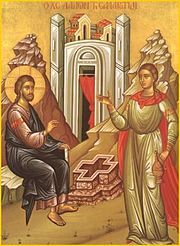Svetlana
 Svetlana is often used in reference to the Samaritan woman at the well in the Biblical Gospel of John. It is the Russian version of the Greek saint name Photini, meaning "enlightened" | |
| Gender | female (feminine) |
|---|---|
| Origin | |
| Word/name | Russia |
| Meaning | "light", "pure" |
| Region of origin | Russian, Serbian, Bulgarian, Macedonian, Ukrainian, Lithuanian, Circassian |
| Other names | |
| Nickname(s) | Sveta, Lana, Ceca, Svetla, Svetka, Svetochka, Svetlanka, Svetulya, Svetik, Svetti |
| Related names | Svitlana, Sviatlana, Svjetlana, Świetlana |
Svetlana (Cyrillic: Светлана) is a common Orthodox Slavic feminine given name, deriving from the East and South Slavic root svet (Cyrillic: свет), meaning "light", "shining", "luminescent", "pure", "blessed", or "holy", depending upon context similar if not the same as the word Shweta in Sanskrit.[1]
Particularly unique among similar common Russian names, this one is not of ancient Slavic origin, but was coined by Alexander Vostokov in 1802 and popularized by Vasily Zhukovsky in his eponymous ballad "Svetlana", the latter first published in 1813. The name is also used in Ukraine, Belarus, Slovakia, Macedonia, and Serbia, with a number of occurrences in non-Slavic countries.[2]

In the Russian Orthodox Church Svetlana is used as a Russian translation of Photina (derived from phos (Greek: φως, "light")), a name sometimes ascribed to the Samaritan woman at Jacob's well (the Bible, John 4).
Semantically similar names to this are Lucia (of Latin origin, meaning "light"), Claire ("light" or "clear" in French, equivalent to Spanish and Portuguese Clara), Roxana (from Old Persian, "little shiny star, light"), and Shweta (Sanskrit, "white, pure"[3]).
Variants
The Ukrainian equivalent of the name is Svitlana (Ukrainian: Світлана), the Belarusian is Sviatlana (Belarusian: Святлана), the Polish variant is Świetlana, and the Czech is Světlana. The Serbo-Croatian speaking area has three pronunciations: Ijekavian Svjetlana (Свјетлана), Ekavian Svetlana (Светлана) and Ikavian Svitlana (Свитлана) are used according to local customs.
Diminutives
Russian language diminutives include Sveta (Russian: Света), used in Russian-speaking countries, and Lana (the latter is mainly used outside the former USSR).
Sveta also means "saint" in Bulgarian. The Slavic element Svet means "blessed, holy, bright".
Serbian language diminutives of the name are Sveta (Света), and Ceca (Цеца, pronounced Tsetsa).
Ban on name
The Russian onomasticon in the 19th century was a closed conservative system, practically incapable of replenishment. A new name could appear only through the recognition by the Russian Orthodox Church of a new saint – the bearer of the name. But by the 19th century, the list of permitted names was generally established and the new saints did not affect the namebook (menologium), since they already bore names from the calendar; their glorification merely reproduced famous names. For example, the name Ivan was mentioned 79 times in the calendar of the late 19th century.[4][5]
People
- Svetlana Abrosimova, Russian professional basketball player
- Svetlana Alexievich, Belarusian journalist, writer, 2015 Nobel laureate in Literature
- Svetlana Alliluyeva, the youngest daughter of Joseph Stalin
- Svetlana Biryukova (born 1991), Russian long jumper
- Svetlana Boiko, Russian fencer
- Svetlana Boginskaya, Soviet Belarusian gymnast
- Svetlana Bolshakova, Belgian triple jump athlete
- Svetla Bozhkova (or Svetlana), Bulgarian discus thrower
- Svetlana Cherkasova, Russian middle distance runner
- Svetlana Chmakova, Russian-born comics artist
- Svetlana Gladysheva, Russian alpine skier
- Svetlana Gorshenina, Uzbekistani historian of Central Asia
- Svetlana Ishmouratova, Russian biathlete and soldier
- Svetlana Kapanina, Russian aerobatic pilot
- Svetlana Khodchenkova, Russian actress
- Svetlana Khorkina, Russian gymnast
- Svetlana Koroleva (model), Russian model
- Svetlana Koroleva (water polo), Kazakhstani waterpolo player
- Svetlana Koroleva-Babich, Soviet javelin thrower
- Svetlana Krachevskaya, Soviet Olympic silver medalist in shot put
- Svetlana Kuzina, Russian water polo player
- Svetlana Nikolaevna Kryuchkova, Russian actress
- Svetlana Valentinovna Kryuchkova, Russian volleyball player
- Svetlana Kulikova, Russian ice dancer
- Svetlana Kuznetsova, Russian tennis player
- Svetlana Loboda, Ukrainian singer
- Svetlana Lunkina, Russian ballet dancer
- Svetlana Masterkova, Russian middle distance runner
- Svetlana Matveeva, Russian chess player
- Svitlana Maziy, Ukrainian rower
- Svetlana Medvedeva, wife of Russian Prime Minister Dmitry Anatolyevich Medvedev
- Svetlana Melnikova, Soviet discus thrower and shotputter
- Svetlana Moskalets, Russian heptathlete
- Svetlana Nageykina, Soviet/Russian cross-country skier
- Svetlana Pankratova, world record-holder for longest female legs
- Svetlana Paramygina, Soviet Belarusian biathlete
- Svetlana Petcherskaia, Russian biathlete
- Svetlana Pletneva, Russian archeologist and historian
- Svetlana Ražnatović, Serbian pop-folk singer from Serbia
- Svetlana Roudenko, Russian-American mathematician
- Svetlana Savitskaya, Soviet cosmonaut
- Svetlana Smirnova, Soviet and Russian actress
- Svetlana Smirnova (sport shooter), Soviet and Russian sport shooter
- Svetlana Ulmasova, Soviet long-distance runner
- Svetlana Vysokova, Russian speed skater
- Svetlana Zainetdinova, Soviet-Estonian chess player and coach
- Svetlana Zakharova (dancer), principal dancer with the Bolshoï Ballet
- Svetlana Zakharova (athlete), Russian long-distance runner
See also
- Alexander Vostokov
- Shweta, equivalent South Asian name
- Keiko, equivalent Japanese name
References
- ^ Monier-Williams, Monier (1899). A Sanskrit-English Dictionary: Etymologically and Philologically Arranged with Special Reference to Cognate Indo-European Languages. Oxford: Clarendon Press. OCLC 685239912.
- ^ "Baby Names, Name Meaning, Popularity". BabyCenter.
- ^ Monier-Williams, Monier (1899). A Sanskrit-English Dictionary: Etymologically and Philologically Arranged with Special Reference to Cognate Indo-European Languages. Oxford: Clarendon Press. OCLC 685239912.
- ^ Никонов В. А. (1974). "Личные имена у русских сегодня". Имя и общество. М.: Наука. pp. 66–85.
- ^ Суперанская А. В., Суслова, А. В. (2008). "Так было – так стало". О русских именах (5-е изд., перераб ed.). СПб.: Авалонъ. pp. 49–85. ISBN 978-5-903605-04-0.
{{cite book}}: CS1 maint: multiple names: authors list (link)
